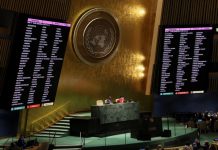
The United Nations Security Council is calling for talks to create a new government in Afghanistan and an end to fighting and abuse after UN chief Antonio Guterres warned of “chilling” Taliban curbs on human rights and mounting violations against women and girls.
The 15-member council issued a statement on Monday after Guterres appealed to the body to “use all tools at its disposal to suppress the global terrorist threat in Afghanistan” and guarantee respect for human rights.
“We cannot and must not abandon the people of Afghanistan,” Guterres told the Security Council.
The emergency UNSC meeting on Afghanistan was held on Monday at the UN headquarters in New York after the Taliban entered Kabul and President Ashraf Ghani left Afghanistan on Sunda. The group took over the country 20 years after they were overthrown by a US-led invasion.
The Security Council stressed the importance of combating “terrorism” in Afghanistan to ensure other countries were not threatened or attacked, and said, “that neither the Taliban nor any other Afghan group or individual should support terrorists operating on the territory of any other country”.
It called for an immediate cessation of all hostilities and the establishment, through inclusive negotiations, of a new government that should include women.
Guterres told the council he had received “chilling reports of severe restrictions on human rights throughout the country. I am particularly concerned by accounts of mounting human rights violations against the women and girls of Afghanistan.”
At this “grave hour”, the secretary-general urged all parties, especially the Taliban, “to exercise utmost restraint to protect lives and to ensure that humanitarian needs can be met”.
Under Taliban rule between 1996 and 2001, women could not work, girls were not allowed to attend school and women had to cover their faces and be accompanied by a male relative if they wanted to venture out of their homes.
“Attacks against civilians or civilian objects must stop. The human rights and fundamental freedoms of all Afghan citizens, especially women, girls and members of minority groups, must be respected,” US Ambassador to the United Nations Linda Thomas-Greenfield told the council.
On Monday, fearing the hardline rule, thousands of people mobbed the city’s airport trying to flee.
Taliban officials have issued statements aimed at calming the panic.
Afghanistan’s UN Ambassador Ghulam Isaczai told the council he was speaking for millions of people “whose fate hangs in the balance”, including women and girls “about to lose their freedom to go to school, to work and to participate in the political, economic, and social life of the country”.
Isaczai called on the council and the UN not to recognise any administration that achieves power by force or any government that is not inclusive. He urged them to call for the immediate establishment of an inclusive transitional government.
Ireland’s UN Ambassador Geraldine Byrne Nason called on the Security Council to stand with the women of Afghanistan amid “multiple and credible reports of summary executions, forced marriage and of sexual and gender-based violence”.
“The Taliban have reportedly said that women have nothing to fear from them,” she told the council. “Telling the international community what it wants to hear will fool no one. We will not turn a blind eye to the truth.”
Russian UN Ambassador Vassily Nebenzia said the Taliban’s quick defeat of government forces “took everyone by surprise”.
“Currently, we believe that there is no point in panicking … a widespread bloodbath amongst civilians has been avoided. We urge all Afghan parties to refrain from hostilities and to foster a settlement peacefully,” he said.
“Afghanistan must never again become a haven for terrorists. This is the bottom line,” China’s deputy UN Ambassador Geng Shuang told the council. “We hope that the Taliban … make a clean break with the terrorist organisations.”
The UN has about 3,000 national staff and about 300 international staff on the ground in Afghanistan. On Friday, the UN said some staff had been relocated to Kabul but that none had been evacuated.
“The United Nations’s presence will adapt to the security situation. But above all, we will stay and deliver in support of the Afghan people in their hour of need,” Guterres said.









